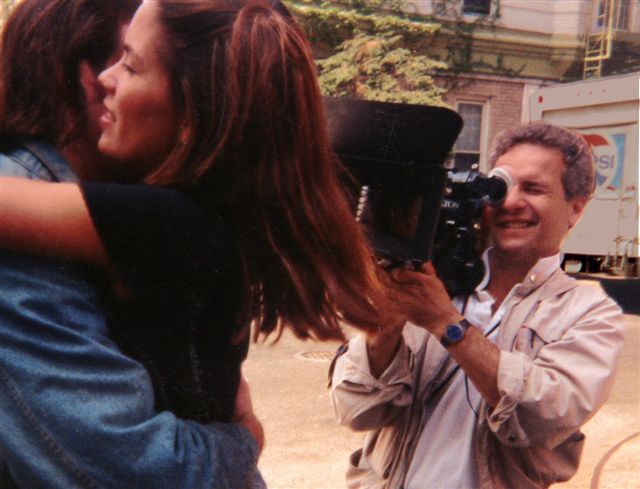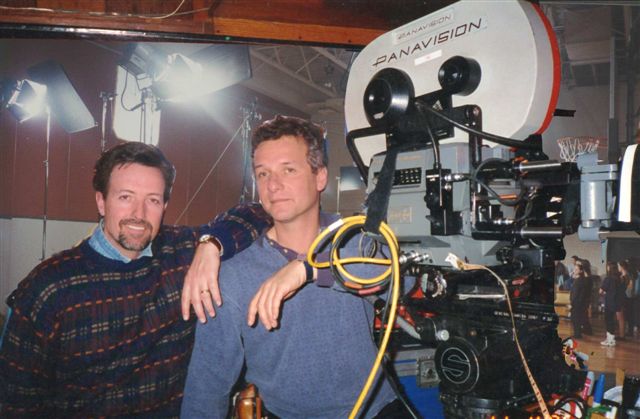 |
Dick Fisher, Director of Photography

Dick
Fisher began his professional
career as a television cameraman shooting 16mm newsreels and commercials for
a tiny station (WUTR) in upstate Utica, NY. Returning home to New York City in 1980, he pioneered the video newsmagazine format as
the first videographer for PM Magazine.
Launching his own company, Videography Productions, Inc., he then applied his talents to many reality based broadcast
television programs such as Entertainment Tonight, Lifestyles Of The Rich And Famous,
Inside Edition, A Current Affair, Hard Copy, Extra, Metromedia and Fox News.
In 1994, he produced, shot and edited The
Brothers McMullen the Grand Jury Prizewinner at the 1995 Sundance Film Festival, and winner of many other awards. Variety Magazine reported the film as the
2nd highest grossing independent release of 1995, and the most profitable film of the year ($13.4 million domestic
gross against a final production cost of $275,000).
Since
The Brothers McMullen, Mr. Fisher shot seven more feature films, Strong Island Boys (1996) with Selma Blair, Mr. Vincent (Sundance 1997), with Frank John Hughes, One Way Out (Arrow
Releasing, 1999), with Michael Ironside, Rum
& Coke (2001), with Juan Carlos Hernandez Burial Ground, with Chris Mitchum, his first 24p HD feature, Day of Redemption (2003) with Jeff Fahey and
most recently, The Unknown, (2004) currently in post production.
Mr.
Fisher studied communications and film making at
Fordham University (BA, 1970) and Syracuses Newhouse School of Communication (MA,
1978). Practical feature film experience came on the sets of Quiz Show, The Paper, Age Of Innocence, Carlitos Way, The Scout, It Could Happen To You, Wolf, Sliver, and other feature films on which he served as a video camera operator.
 Film Addiction recently caught up with Dick Fisher for a short question and answer session.
We would like to thank Mr. Fisher for taking the time to conduct the following Q&A.
Film Addiction: "Which do you prefer as a cinematographer to work on television
productions or movies? Is there a difference stylistically?"
Dick Fisher:"As a cinematographer working on feature films is far more
rewarding. As the Director of Photographer of a movie you become the "author" of the film's look. Each film is
a unique entitiy, a separate reality or narrative universe. All of the TV work I've done is more focused on following
established conventions. There are dramatic TV shows (Alias, CSI, Law & Order, or example) which try to establish
their own cinematic style but I've never had the opportunity to shoot one of those".
FA: "Tell me about your latest project "The Unknown"-Who are the actors,
director, storyline, things like that".
Currently I am editing the film DAY OF REDEMPTION starring Jeff Fahey, which I also shot.
I'm just getting up to speed on the new Final Cut Pro 4 which is an amazing piece of software.
FA: You have seen the production of movies both from
the independent and major studio side, what is the biggest difference as far as shooting and how things are run on the set?
DF:"The big advantage of the independent world is the level of control
available to the film maker. Of course the trade off is lack of resources. In other words, working on studio
films affords the filmmaker the opportunity to use the lastest tools and equipment but many creative decisions are made by commitees
of executives rather than the core of producers, directors, and crew on location".
FA: What do you believe has been your greatest achievement to date?
DF:"Ever time I get behind a camera and hear the 1st AD call, "roll camera!"
I thank my lucky stars that I can work again as a Director of Photography. This was, and is, my life long ambition.
I'm still amazed that I was able to produce (and shoot and edit) THE BROTHERS MCMULLEN for so little and then win the Grand
Prize at Sundance and become Fox Searchlight's first release. (And a very successful one.) I am humbled that my
film has inspired a whole new generation of independent filmmakers to follow their dreams as I did with Eddie Burns back in
1995".

FA: Do you prefer working with video or film? And do you see an eventual end
to film (death by video so to speak)?
DF:'Until recently this was a no brainer...film ruled. Video equaled TV,
aesthetically and literally. The reason for this is that video did not have the lyrical, narrative look of film.
It was too realistic. Film is the medium of visual storytelling while video was a documentary format. In addition
to this NTSC is a particularly poor system, designed around technical parameters pertaining to broadcasting requirements and
compatibility with (then) existing black and white broadcasting. Television's 4:3 format , that squarish TV image
is not a comfortable palette for storytelling. Film on the other hand with it's wider aspect ratio, expotentionally higher
resolution, and 24 frames per second flicker is a much better storytelling medium.
Digital video, and particularly, 24p (that's 24 frame per second, progressive) has dramatically
changed the picture, literally and figuratively. By increasing resolution, adding a wider aspect ratio (16:9), and electronically
recreating film's 24 fps flicker, the digital revolution is now truly upon us. Eliminating the high cost of
film stock and processing dramatically reduces the up front cost of making movies.
It is clear that in the not too distant future digital video acquisition and delivery systems
will replace film. How soon this will happen is not so clear. Despite the questionable claims of George Lucas
and Robert Rodriquez, film is still a far superior acquisition format. The digital revolution which has completely
changed the world of post production, with non-linear editing and digital intermediates, will eventually eclipse film.
Most of the film makers I know hope that this won't happen until digital video has been advanced to level equal or superior
to the fantastic film stocks and cameras available to us today. As of this writing film is a superior acquisition
format.
None the less, digital video now significantly lowers the entry fee for anyone compelled
to tell a story on a screen. Hopefully this will allow a new generation of film makers to prove to the world that they
have something to say. At the very least there should be significantly fewer wannabes saying, "if only I'd had
the money to make my movie!"
FA: What part do you play (or have played in the past) in the editing of a film?
or do you feel your job is over once the film is in the can?
DF:"At the beginning of my career I worked as a news reel cameraman at a small
television station in Upstate New York. My responsibilities included editing the news film I shot. As I moved
back to New York City working at other television stations news shooters typically edited their own material. When I
finally landed back in NYC jobs were more specialized and I concentrated on camera. When I decided, 15 years later,
to try to break into the feature film end of the business one option was to make my own film. Since I had access to
editing equipment (at that time linear video) and I owned my own camera and lighting equipment it I became, by default, the
editor (as well as producer and director of photography) of THE BROTHERS MCMULLEN.
Currently I am editing, on Final Cut Pro, DAY OF REDEMPTION starring Jeff Fahey, a film I shot
on digital video last spring. Of the nine films I shot since 1995, I edited three of them".
FA:Looking at your bio I noticed that you did PM Magazine. I remember that show
when it aired in the Oklahoma City area (where I live by the way). I remember that being a fabulous show. Do you ever see
a show with a similar format making a return?
DF:"PM Magazine was an important show in as much as it was the first successful
infotainment program. Using documentary techniques (but with portable 3/4" video equipment) it told stories of extraordinary
things happening to ordinary people. Too many shows to mention have built upon this concept. Current "reality"
programming is different from this only in as much as the extraordinary circumstance is dreamed up by the show's producers".
FA: "Who has molded your style or to state that in another way who were
your early influences?
I always loved watching movies and I saw as many as a could. The making of films seemed
like the most fascinating procedure and I was always drawn to it. I studied the work of Alfred Hitchcock and Frederico
Fellini as well as the work and careers of many members of the American Society of Cinematographers. I've been a subscriber
and avid reader of the AMERICAN CINEMATOGRAPHER Magazine since 1972 (yes, I have all of those back issues!) and it has been,
as still is, an inspiration and a guide".
FA: Who are some current professionals in your field that your admire their
work?
DF:"Anyone who will hire me I admire immensely. People who are honest
and work with integrity. Filmmakers who enjoy life and appreciate their good luck in being able to make movies".
|